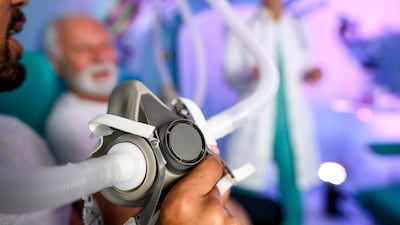Alzheimer's disease can be effectively treated by giving oxygen to patients in pressurised chambers, a study from Tel Aviv University suggests.
Over the course of three months, for 90 minutes a day, five days a week, six elderly patients exhibiting the early signs of dementia were administered oxygen in a hyperbaric chamber.
Researchers said the results showed blood flow increased to the triallists' brains from 16 per cent to 23 per cent and all demonstrated significantly improved brain function.
Memory test scores increased by 16.5 per cent, attention by six per cent, and information processing speeds by 10.3 per cent.
The chamber works by mimicking the state of oxygen shortage or 'hypoxia', effectively changing the structure of vessels in the brain. This means that when those in the chamber are fed oxygen, their tissue absorbs it at a faster rate and in a greater volume.
An adjunctive study on animals showed the therapy eradicated sticky amyloid plaques which prevent cells from communication and are a reliable indicator of Alzheimer's.
Earlier this year, US health authorities approved Aducanumab as the first drug to treat Alzheimer's, but there is widespread scepticism as to its efficacy.
Larger-scale tests needed to back up results
Experts said the Tel Aviv researchers' results were promising but larger-scale studies would be needed to corroborate them.
“Larger-scale clinical trials with many more people are needed to ascertain whether this treatment is effective, particularly when measuring longer term benefits to memory and thinking," said Dr Susan Kohlhaas, director of research at Alzheimer’s.
professor of dementia research at University of Nottingham
Tom Dening, professor of dementia research at University of Nottingham, said: “The paper presents an interesting approach, in particular reminding us of the importance of vascular factors in the development not only of vascular dementia but Alzheimer’s disease too.”
Beyond the therapeutic potential of oxygen treatment, there would be logistical drawbacks.
“Presumably to be useful, the treatment would have to be continued indefinitely, so any patients would have to be very highly motivated and have good transport links to the treatment facility,” said Prof Dening.
“If we consider that the number of people with dementia in the UK is approaching one million, it is hard to see how hyperbaric oxygen could ever be available on this scale.
“In short, it’s an interesting idea but a long way off meeting the usual criteria to become a standard treatment.”

